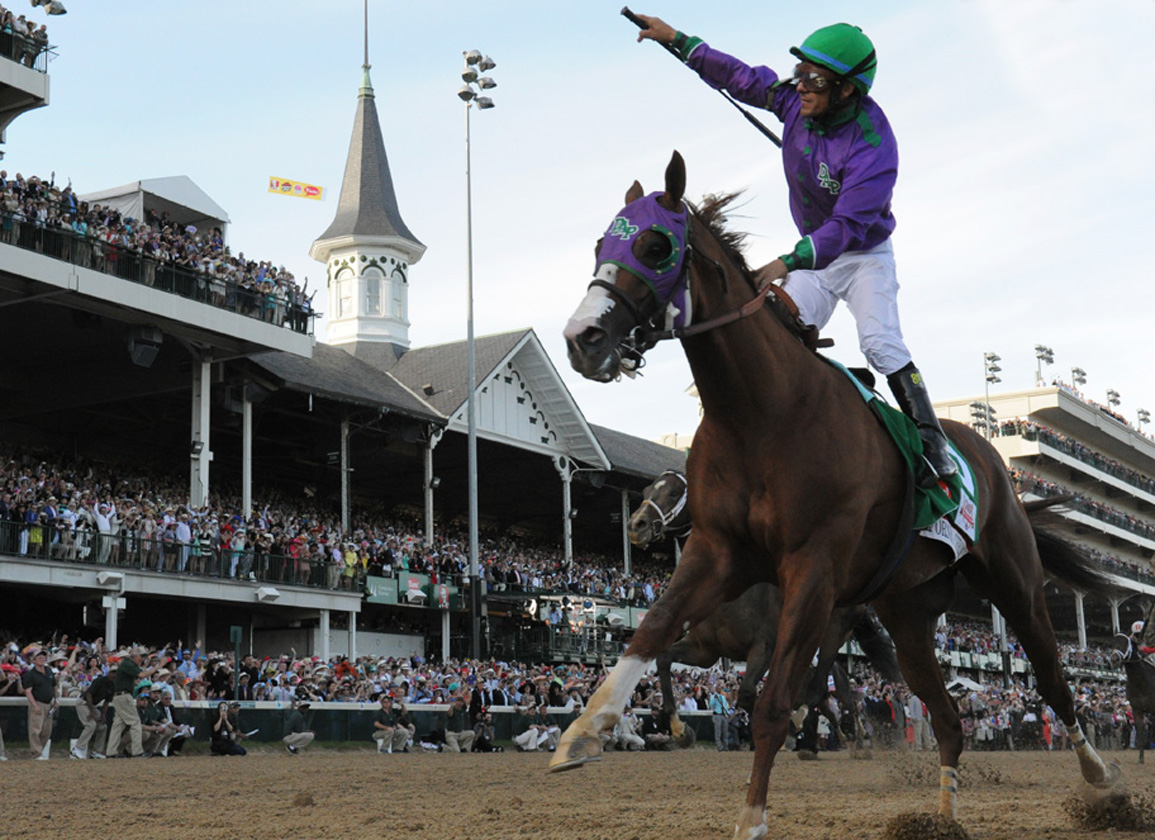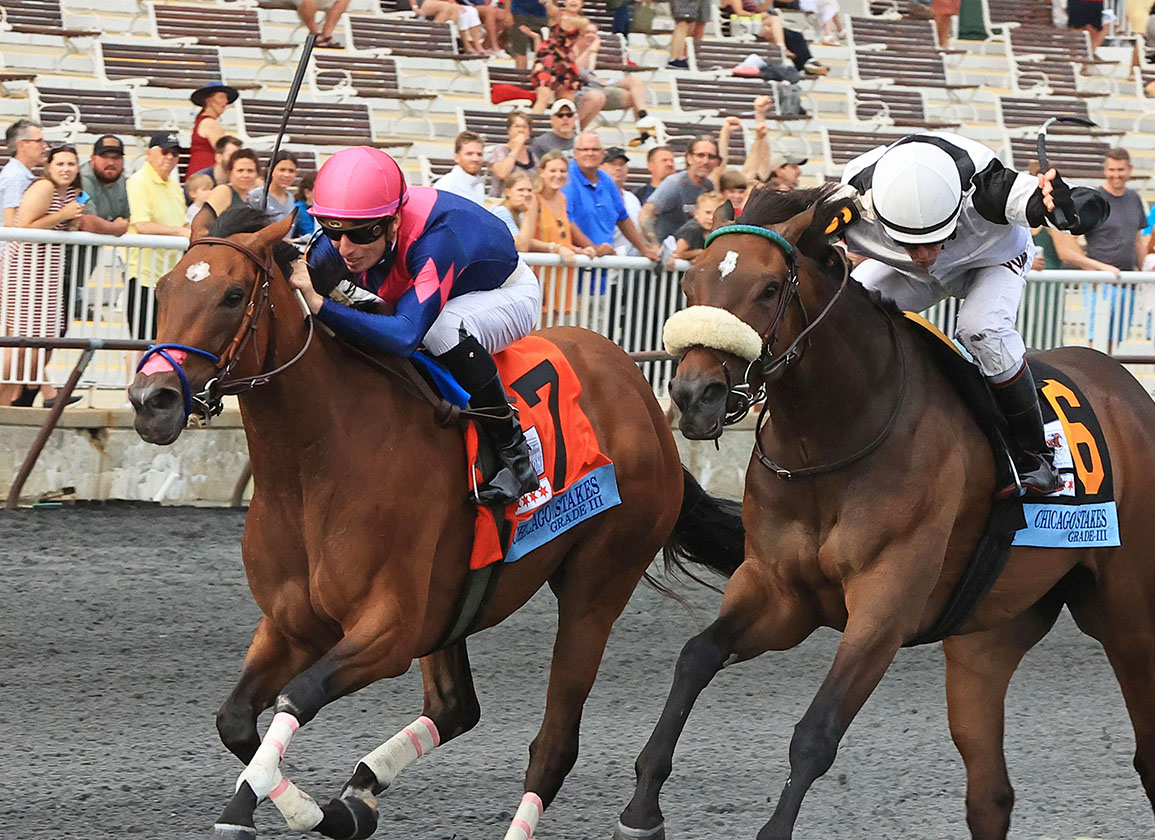She's still only 28, and it isn't three years since she started training. Yet a first graded stakes success for Anna Meah last weekend was welcomed with a depth of perspective extending both forward and back.
On the one hand, she has always been a woman in a hurry: however crammed the automobile she drove south from Washington in December 2012, her heart set on finding a backstretch job in California, the years since have been no less packed with experience. Indeed, the veteran trainer of a small string at Hollywood Park who hired Meah as assistant the following April also launched another career that very same month: a Cal-bred chestnut by Lucky Pulpit, name of California Chrome.
Even since starting to train, however, Meah has been through enough–a terrifying trackwork smash, for one thing, not to mention a barn reboot in Kentucky on the very eve of a global pandemic–to view the success of Abby Hatcher (Ire) (Acclamation {GB}) in the GIII Chicago S. at Arlington as a boost to the morale of her small, dedicated team, but otherwise only as a first milestone on what remains a long and challenging road ahead.
“When I started training, I had some funny luck,” she says. “I don't want to say bad luck, because I know things can always be worse. But, yeah, funny luck. I thought I had my first winner in a stakes race at Del Mar. What a fairytale that would have been! But he was disqualified. It was one of those that could have gone either way, depending who you asked, but they took him down.
“Between starting out that October, and the end of the year, I had 16 runners. Eight finished second. I was thinking, 'Man, this horse-training business is not all I was hoping… Am I ever going to win a race?' That was a humbling experience–but it's also how this whole game is. So, yes, winning my first graded stakes felt amazing, and nothing will take that away. But at the same time, it's a reminder to stay humble. There's still so much to be done, so many goals to accomplish.”
As such, Meah has found nearly as much satisfaction in the less conspicuous breakthroughs that assure her, in quiet increments, that she's heading the right way.
“I don't know what it was about June, but we hit a ton of milestones,” she notes. “We finally won first time off a claim, having bumped up from $30,000 claimer to maiden special weight; then the following week we won with a first-time starter, also for the first time; and I believe Jungle Juice (Ire) (Bungle Inthejungle {GB}) [a Churchill optional allowance winner last week] is the first to win three times for me. And then of course the graded stakes. So we had a huge month. We're not a huge crew but the staff work so hard, some of them traveled across the country to stay with me, and I'm so thankful to them. It's been really rewarding for everyone.”
That migration from California, early last year, was a huge decision so early in Meah's training career. Logically, there was no point bringing her Cal-breds. Leaving them behind, however, reduced the string to 11. But she now has 27 in the barn, and was able to build up support even after the shock that awaited her in Lexington.
“I have a lot of clients along the East Coast that were very supportive of the idea,” she explains. “California was undergoing a bit of scrutiny at the time, and not many people wanted to send horses there. That was sad to see, I'd had a great run out there, but for a young trainer getting started, it was really hard to give it an honest go. You could enter a horse and if the race didn't fill you might be looking at another month. We have so many more options here.
“But yes, it was a bit alarming to move our stable from Santa Anita to Keeneland and be told, after our first day training, that they were cancelling the meet. 'What have I done?' I said. 'I've shipped my horses all this way for one day of training!' Obviously I soon saw that this wasn't a Kentucky problem but a global one. And we made do with what we had. We shipped over to Oklahoma and won a race, for instance. But even during the pandemic I was given a chance by a lot of new people, which just goes to show how Kentucky has helped my business thrive.”
That Oklahoma winner, at Will Rogers Downs, was very dear to Meah. For it was Vallestina (Leroidesanimaux {Brz}) she was riding round Santa Anita one morning in June 2019 when the pair of them were badly lacerated in a freak accident. The vets candidly doubted whether Vallestina would make it.

Meah with Vallestina and her Midnight Storm foal | Courtesy David Meah
“But long story short, she ended up pulling through,” Meah says. “And she not only came back and won at Santa Anita but also became the first to win for me after we moved out here. It's been a bit of a fairy tale–she has just had her first foal by Midnight Storm, and the plan would be to bring him into training someday–so let's hope it keeps panning out that way.”
After that horrible drama, Meah reluctantly acknowledged that it was neither sensible nor necessary to continue riding trackwork herself. So began a new chapter in her relationship with the horse, which had first evolved in a backwater of Thoroughbred racing–Meah was born in Oregon and raised in Washington–and initially devoted her to rodeos. Her ultimate vocation would only gradually come into focus.
In adolescence, she began shadowing Dr. Solomon Benneroch, the veterinarian who tended her rodeo mounts but also had clients with a Quarter Horse barn. “I begged them for a job for two years,” Meah recalls. “I just bugged them until they finally called and said, okay, this summer.” She went on to study Animal Science at Montana State but her real education would come in grooming and exercising at places like Portland Meadows, Emerald Downs and Grants Pass. A world away from Keeneland–her current base, though she's excited to be moving back into a renovated barn at Kentucky's Thoroughbred Center in October–but a perfect environment to learn the nuances of equine care.
“Working at those smaller racetracks, you learned a lot about what you can and can't do with horses,” she says. “It was exciting to be a part of it, and I'm glad I was. You could really build a foundation that way, and I feel that's so important for everything in life.”
The graduation ceremony awaited in the new, life-changing journey Meah began in tandem with California Chrome. Her four years with Art Sherman would span two Horse of the Year campaigns.
“Honestly, I have been so blessed,” she reflects. “Coming into this game, and landing that job with Art, and becoming part of Chrome's entire career. The Shermans are still like family to me, to this day. They were the first people to really take me under their wing. And Art is one special horseman. Chrome wasn't a difficult horse–very sound, great mind–but Art is such a wonderful person, and loves his horses so much, I know he did everything right by that horse and gave him the very best opportunity to succeed. Maybe in some bigger barns, little things may have been overlooked. Every small detail needs to come together to make big things happen.”
Just as when she had first cut her teeth on the racetrack, however, Meah feels that she learned as much from the lesser horses.
“Art trusted me to run the barn when he wasn't there,” she explains. “At the time, I felt I was missing out on the fun a little, like when Chrome went out to Dubai for three months. But with a 12-hour time difference I couldn't call about every little issue. I had to figure things out.”
Nonetheless Meah was also privileged to have a regular, hands-on connection with the champion.
“I breezed Chrome all the way into most of his races, unless of course Victor [Espinoza] was out for it,” she says. “That was quite an adrenaline rush. It's not anything I could put into words. I just let him do his thing, he knew what he needed to do and how to do it, but the way he traveled, the way he covered the ground, he just had so much class about him. And it's not like his pedigree was outstanding: he just had such a big heart.”
That elusive grail, so hard to identify, remains ever in mind when stocking her own barn from limited resources. Likewise for husband David, as a bloodstock agent whose transatlantic partnership with Jamie Lloyd often targets horses off the track in Ireland or his native Britain. David has also had a fertile association with Richard Baltas, with whom Meah rounded off her apprenticeship after the retirement of California Chrome.
“Baltas probably had over 100 horses,” she recalls. “So it was a totally different experience, and more demanding, both physically and in terms of time. More runners, more problems. Again, he trusted me, for instance to travel east with horses like Gas Station Sushi (Into Mischief). She was such a star to deal with, and that was also how I really fell in love with Kentucky as Horse Country.”
David–who bought that filly, winner of the GIII Beaumont S., as a 2-year-old–can these days sometimes encourage clientele toward his wife's barn and indeed heads up the partnership that races Abby Hatcher, herself an Irish import.
“We'd actually been eyeing that race for a long time,” Meah says. “As you know, in horseracing things rarely go to plan, but for once everything worked out. We thought we'd be happy just to get her some black type, but to actually go up there and win was unbelievable. When she first came over here, I put some works into her and knew she had ability. But then I turned her out, gave her a bit of time to adjust and be a horse for a while. And that has really paid off. David has provided me with a bunch of horses from Europe that I've had success with, so it's really nice to have his support and his eye.”
Her first debt, however, remains to parents with zero horse connection who nonetheless indulged their daughter's obsession. “Rodeo was obviously very different, though maybe suggested that I have a very strong competitive edge!” Meah says. “It was every weekend, so I'm very thankful that I was sometimes allowed out of school early, or to miss a day for traveling. I always knew I wanted to spend the rest of my life with horses. But I didn't come into this business with the mentality that I wanted to be trainer. It's just how the stepping stones laid out until it became a no-brainer not to give it a try.
“I did try to make sure I had that foundation before branching out. I didn't want to start out with two or three horses, with me as owner, and piece things together as I went along. I had people ready to give me a chance. I don't run into too many young trainers, male or female, and I feel there are plenty of people out there who want a trainer that's young and hungry. I have put in a ton of work, but a lot of people do the same without having a graded success so early in their career. So when all that work pays off like this, I do feel very blessed.”
The post Meah Adding Horsepower to Chrome Finish appeared first on TDN | Thoroughbred Daily News | Horse Racing News, Results and Video | Thoroughbred Breeding and Auctions.



